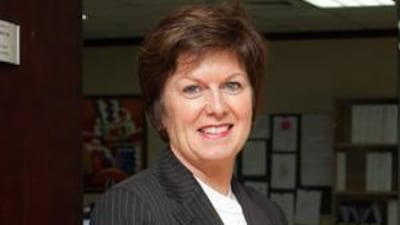ABU DHABI // In 2007, the Government hired one of the country's largest private education providers to help improve state schools. Two years on, the company says it has had some great successes, and is calling for such partnerships to be adopted across the board.
"They have tried model schools, they have tried the Madares Al Ghad, they have tried the system that they had up in Sharjah - now nothing has been as impacting as [this programme]," said Margaret Corcoran, the senior director of the School Improvement Partnership, the public-private partnership between Global Education Management Systems (Gems) and the public education system. "There are no gimmicks. ... It's day in, day out grind with people, but the results are there. We're monitored, and the results we're getting about the impact we're having are very good.
"When I go into the schools, I can see a difference in student behaviour, in the state of the school, in the fact that student work is displayed, and not only that it is displayed, but that it has a relevance to the curriculum." Nevertheless, she says the partnership still faces an uphill battle with issues such as a lack of professionalism among teachers and poorly maintained school buildings. "You can walk through seas of rubbish, because nobody thinks there is anything wrong with just dumping it on the ground. When you first walk into that you're a bit blown away by it.
"It's not the case as in a western school, where you would say, 'everybody out, pick up the litter'... very deep-rooted behaviours that need shifting." Three years ago, the company, which owns the largest network of private schools in the Emirates, serving almost 100,000 pupils at 26 different institutions, formed its SIP division to work with state schools in the UAE and around the region who sought private help in making reforms.
In Abu Dhabi, where more than 100 state schools work with private companies, Ms Corcoran said that SIP's programmes have allowed local education authorities to focus on problems in a way "no government could do... on its own". Companies such as Mosaica, which runs charter schools in the US, and the British firm Nord Anglia, were among the first in the door. Gems jumped into the fray in the second year of the programme.
Though Ms Corcoran is optimistic, she believes that reform will take time to spread throughout the system. "There is a huge amount to be done, and to actually deliver on those things successfully is very, very difficult," she said. In May, SIP was awarded a contract to work with state schools in South Africa, and it is looking to take on more schools in Abu Dhabi and expand into Egypt. @Email:klewis@thenational.ae

